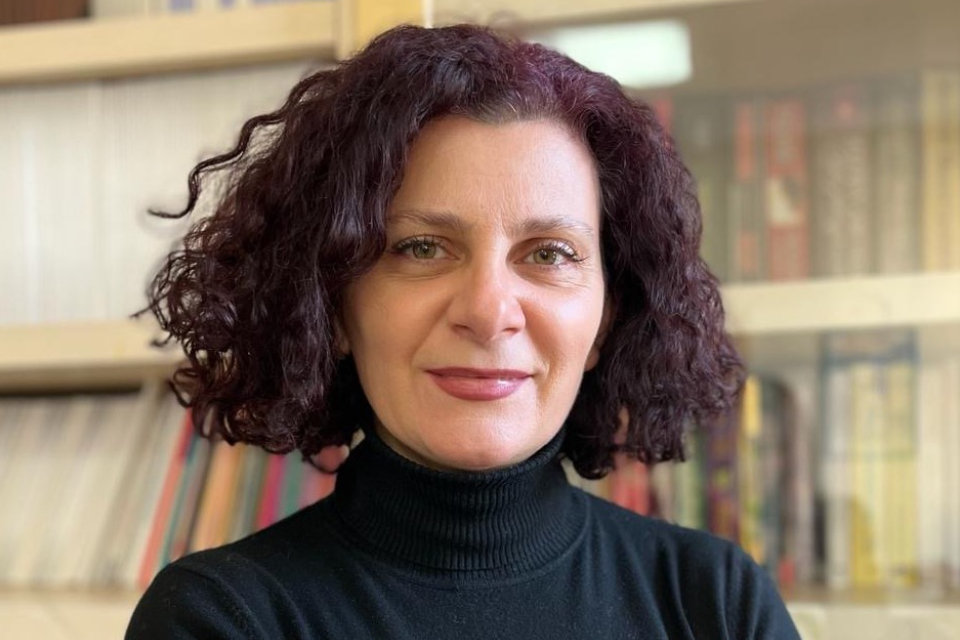In the words of Stela Tanellari: “Employment is essential for ensuring the successful reintegration of women survivors of violence into society”
Date:

Stela Tanellari is the Deputy Director and Reintegration Programme Manager of Different and Equal, an organisation in Albania that provides services for women survivors of violence. It has developed a complex approach for women’s economic reintegration under UN Women’s regional programme on ending violence against women “Implementing Norms, Changing Minds,” funded by the European Union. Tanellari has almost 20 years of experience working directly with women survivors of violence and their children, advocating for and advancing survivors’ rights, and managing programmes on topics such as women’s economic empowerment and societal reintegration and violence prevention. In this article, Tanellari details the organisation’s approach to economic reintegration for women survivors of violence, why it is needed and the challenges it poses.
![]()
In our organisation, we focus on the economic empowerment of women and girl survivors of violence. We support them to engage in the job market because employment is one of the key steps to ensuring their successful reintegration into society. The programme is built in three phases of reintegration so that the transition to an independent life is smooth and gradual.
Within our organisation, economic empowerment includes offering employment counselling and support, vocational training and/or professional courses. We also support beneficiaries to open small businesses and secure internships or on-the-job training.
However, the most essential aspect of economic reintegration programme is empowerment. From the start, when women survivors are referred to us, they are made aware that the programme cannot be successful without their participation and involvement.
The services provided for beneficiaries help them manage their trauma and stabilize their emotional, physical, and psychological state. We also provide services to boost their education and skills, empower them socially and economically, and provide them support to open and manage small businesses. All these aspects lead to their empowerment and sustainable reintegration into society.
Reintegration is a long process, and there are certainly challenges along the way. The biggest challenge relates to the safety and security of women who continue to feel threatened by their abusers. In some cases, women cannot return to the cities they lived in previously due to security problems, social stigma, and rejection by their families. As a result, long-term housing remains a big challenge, as in many cases they leave the abuser's apartment and change residences to avoid contact with the abuser's relatives. The housing programmes are not available in every municipality.
Also, especially with the economic upheaval caused by the pandemic, employment opportunities are limited, and the labour market is less stable. We are collaborating closely with the National Employment and Skills Agency, Regional Employment Directorates and as well as with private sector companies to find job placement and job programme alternatives for our beneficiaries.
We have also established an afternoon childcare alternative for mothers who are rebuilding their lives. The childcare centers, available to women survivors of violence, operate outside of the official opening hours of kindergartens, nurseries, and public schools, during hours in which women may need to work but may lack a safe childcare option. Providing afterschool care not only supports women to rebuild independent lives, but also enables their children to flourish in a safe and secure home and community environment.
Nevertheless, the support needed for survivors of violence cannot be provided alone. Collaboration with different state and non-state institutions is essential. Therefore, we collaborate closely with municipalities to institutionalize socio-economic reintegration plans at the local level to ensure that survivors of violence receive the assistance they need until they achieve full reintegration and empowerment.
We have also developed a model to assist municipalities in implementing effective models for the provision of long-term reintegration services. The model emphasizes the need for long-term services focused on the social and economic empowerment of survivors to rehabilitate them after trauma and sustainably reintegrate them into society. Based on this tool, opportunities can be identified to develop successful social plans at the municipal level and successful reintegration plans for survivors at the individual level.”